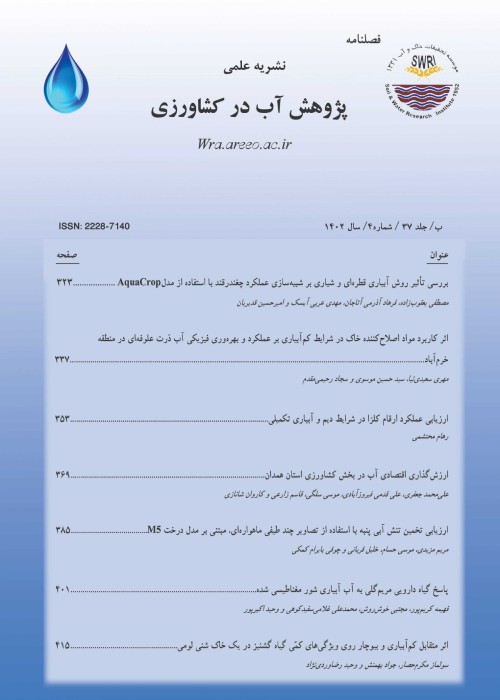Impact of Long-Term Irrigation with Kermanshah Municipal Treated Wastewater on Some Soil Physical Properties
Author(s):
Article Type:
Research/Original Article (دارای رتبه معتبر)
Abstract:
Crisis of renewable water resources and rising demand for access to fresh water in arid and semi-arid countries is increasing. Therefore, it is indispensable to conserve water resources with high quality for urban purposes and drinking and use water resources with lower quality (such as treated wastewater) for other purposes such as agriculture and industry. In these conditions, having adequate information and local data in different parts of the world is essential. Thus, the main purpose of this study was to investigate the effects of two-year long-term irrigation with treated municipal wastewater in comparison with well water (as the control treatment) on the physical properties of soil. The soil physical properties were measured in three layers, each with three replications, and included saturation hydraulic conductivity (Ks), soil moisture characteristic curve, moisture content at field capacity (θFC) and permanent wilting point (θPWP) as well as available water, bulk and practical density, and porosity of the surface soil to depth of 90 cm . The study was conducted using a two-year split plot design. The rsults of statistical analysis showed that there was no uniform trend between various parameters and the influence of irrigation treatments at different depths of soil parameters were different. Results showed that the soil Ks in treatments irrigated with wastewater increased, compared to the control treatments, by 109%, 25%, and 75% in depths of 0-30, 30-60, and 60-90 cm, respectively. In addition, application of treated wastewater caused increase in the soil moisture content at θFC and θPWP point, but reduced the amount of total available water content. The effect of irrigation with treated wastewater decreased surface soil bulk density and increased its practical density. Also, the soil porosity in the 0-30 and 30-60 cm layers was lower compared to the control treatment, but was higher in 60-90 cm layer. Generally, it can be concluded that the use of treated wastewater improves soil physical conditions, but the application of untreated sewage water and TWW for irrigation is not recommended for edible crops.
Keywords:
Language:
Persian
Published:
Journal of Water Research in Agriculture, Volume:31 Issue: 3, 2017
Pages:
493 to 508
magiran.com/p1768981
دانلود و مطالعه متن این مقاله با یکی از روشهای زیر امکان پذیر است:
اشتراک شخصی
با عضویت و پرداخت آنلاین حق اشتراک یکساله به مبلغ 1,390,000ريال میتوانید 70 عنوان مطلب دانلود کنید!
اشتراک سازمانی
به کتابخانه دانشگاه یا محل کار خود پیشنهاد کنید تا اشتراک سازمانی این پایگاه را برای دسترسی نامحدود همه کاربران به متن مطالب تهیه نمایند!
توجه!
- حق عضویت دریافتی صرف حمایت از نشریات عضو و نگهداری، تکمیل و توسعه مگیران میشود.
- پرداخت حق اشتراک و دانلود مقالات اجازه بازنشر آن در سایر رسانههای چاپی و دیجیتال را به کاربر نمیدهد.
In order to view content subscription is required
Personal subscription
Subscribe magiran.com for 70 € euros via PayPal and download 70 articles during a year.
Organization subscription
Please contact us to subscribe your university or library for unlimited access!



